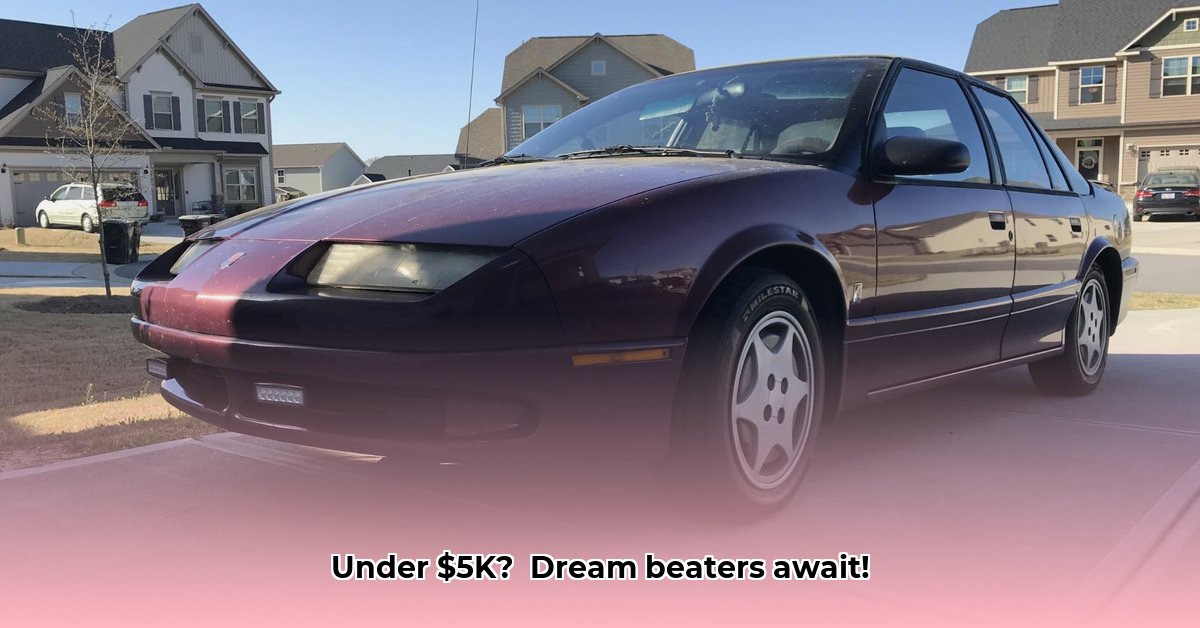
Finding a reliable car for under $5,000 can feel like searching for a needle in a haystack, but it's doable. This guide will help you navigate the used car market and find a dependable beater without breaking the bank.
Finding Your Beater: A Practical Approach
Let's be honest: new cars are a luxury. A "beater car"—a used vehicle that's affordable but functional—is a smart alternative for many. This isn't about buying a lemon; it's about finding a decent, affordable ride. This guide focuses on making informed choices and avoiding costly mistakes.
Why Choose a Beater Car?
The primary reason is simple: affordability. Used cars, especially older models, come with a much lower price tag than their newer counterparts. You avoid that huge initial depreciation hit. This translates to money saved on insurance and registration. There are downsides, but the savings can be substantial. Don't underestimate the value of this.
What to Look For
Before you start your search, identify your needs. Do you need a simple commuter car, or something that can haul cargo? Once you know this, consider these factors:
Age and Mileage: Expect cars 10-20 years old with high mileage. Don't dismiss them outright, but carefully investigate their history. High-mileage Hondas are often more reliable than high-mileage Kias with a spotty maintenance record.
Mechanical Simplicity: Older cars often have simpler mechanics (fewer parts = fewer potential problems). Repairs tend to be less costly.
Reliability: Research! Online forums are goldmines of user experience. Focus on models known for their durability, even in their later years.
Parts Availability: Can you easily find affordable replacement parts? Check online and local auto parts stores before committing.
A Step-by-Step Guide
Set a Realistic Budget: Seriously, stick to it. Factor in potential repairs. "Beater car" usually means under $5,000 (or less, depending on your area).
Online Search: Use Craigslist, Facebook Marketplace, and AutoTrader. Be patient; finding the right car takes time.
Vehicle History Report: This is essential. Services like Carfax or AutoCheck reveal accidents, major repairs, and odometer discrepancies. It's an investment that protects you.
In-Person Inspection: Bring a mechanically inclined friend or hire a mechanic for a pre-purchase inspection. Look for rust, leaks, and worn components.
Test Drive: Listen for unusual sounds, smells (burning oil is a major red flag), and assess the handling.
Professional Pre-Purchase Inspection (Highly Recommended): A mechanic will provide an unbiased assessment and identify potential problems you might miss.
Weighing the Pros and Cons
Beater cars aren't perfect. There are risks, but also significant rewards.
Pros:
- Low Purchase Price: Significantly lower than newer cars.
- Lower Insurance Costs: Usually cheaper to insure older vehicles.
- Simpler Mechanics (often): Repair costs are potentially lower.
Cons:
- Higher Risk of Repairs: Older cars are more likely to require maintenance.
- Potential Safety Concerns: Safety features might be less advanced.
- Lower Fuel Efficiency (sometimes): Some older vehicles consume more fuel.
Maintaining Your Beater: Prevention is Key
Regular maintenance is key. Oil changes, fluid checks, and addressing minor issues early will prevent expensive problems later. Consider this preventative maintenance; it’s an investment, not an expense. A little care will significantly prolong the useful life of your vehicle.
Focusing Your Search: Brands & Models
Japanese brands (Honda and Toyota) generally offer better reliability in this price range. Consider the Honda Civic, Toyota Corolla, or even a Toyota Camry. These models are known for their durability and readily available parts. Other brands might be appealing due to price, but research their reliability carefully before committing.
The Pre-Purchase Inspection: Your Best Friend
A pre-purchase inspection (from a reputable mechanic) is crucial. It protects you from costly surprises and will identify any imminent problems. Think of it as insurance against buying a money pit.
Budgeting for Repairs: Expect the Unexpected
Beater cars require repairs. Build a repair fund. Factor this into your budget. You aren't just buying a car; you're investing in a project.
Safety & Features: Weighing Your Priorities
Older cars often lack modern safety features. Carefully consider this trade-off between price and safety.
Regional Differences: Location Matters
Used car prices vary regionally. Availability does, too. Research your local market conditions.
Conclusion: Responsible Ownership
Finding a reliable beater can be a financially savvy decision, but it requires responsible ownership. Do your homework, conduct thorough inspections, and budget for repairs. By following these tips, you'll increase your chances of finding a reliable, affordable ride.